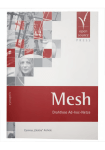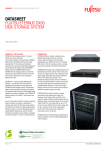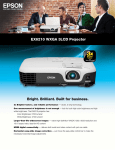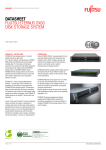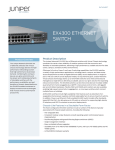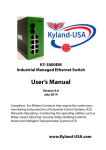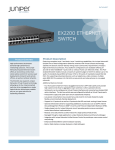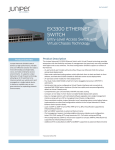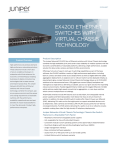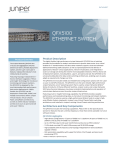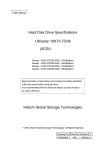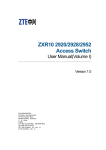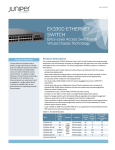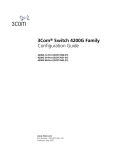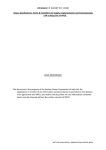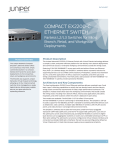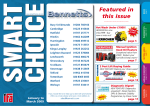Download Juniper EX6200 + 4x 10GE SFP+
Transcript
DATASHEET EX6200 Line of Ethernet Switches Product Overview The Juniper Networks EX6200 line of Ethernet switches is a scalable, resilient, high-performance chassisbased wiring closet solution, providing extremely high port densities in a space-optimized form factor. With a choice of data only or Power over Ethernet (PoE) and PoE+ port options, the EX6200 delivers high availability and tremendous investment protection for enterprise campus environments, as well as data center access deployments using end-of-row designs. Product Description Juniper Networks® EX6210 Ethernet Switch offers a total of 10 slots which allow for highly flexible configurations. Two of the slots are designed to hold Switch Fabric and Routing Engine (SRE) modules, while the remaining eight slots are dedicated I/O slots for holding any combination of EX6200 line cards. Since only one SRE module is required for switch operations, one of the SRE slots can be optionally configured as an I/O slot, enabling the switch to support a total of nine EX6200 line cards. Each SRE module includes four 10GbE uplinks, while the line cards feature full PoE+ support to deliver complete investment protection. Architecture and Key Components At 14 rack units (U) high and just 15.5 inches deep, the EX6210 is compact enough to easily fit in traditional wiring closets, making it ideal for campus deployments. The chassis is cooled front to back by a single fan tray with redundant fans (three groups of two each). The EX6210 can operate with a single fan failure, and in the unlikely event of an entire fan tray failure, the system will operate for two minutes with no cooling while the fan tray is replaced. The EX6210 switch has four power supply slots and supports 2,500 W AC, 5,000 W AC, or 2,100 W DC power supplies (different power supplies should not be mixed in the same chassis). The EX6210 ships with a single power supply; up to three more load-sharing power supplies can be added and configured for N+1 or N+N (2+2) redundancy, providing up to 10,000 W AC (with 2,500 W AC PSUs), 20,000 W (with 5,000 W AC PSUs), or 8,400 W DC (with 2,100 W DC PSUs) to the chassis. 1 Switch Fabric and Routing Engine Module The SRE module, which provides 720 Gbps (full duplex) of switching capacity to the EX6200 chassis, includes an integrated switch fabric and is responsible for system configuration and management, running bridging and routing protocols, and managing the user interface. Campus Wiring Closet Aggregation IDF 1 Access A front panel, chassis-level LCD panel displays Routing Engine status as well as chassis component alarm information for rapid problem identification and resolution to simplify overall operations. The LCD also provides a flexible, user-friendly interface for performing device initialization and configuration rollbacks, reporting system status and alarm notification, or restoring the switch to its default settings. EX6200 Line Cards Line cards are responsible for implementing packet forwarding, filtering, and queuing functions. The EX6200 line supports the following line cards: • EX6200-48T: A 48-port 10/100/1000BASE-T RJ-45 line card offering 3 to 6 μs port-to-port latency for all packet sizes (except jumbo frame), eight quality-of-service (QoS) queues per port, and a 6 MB buffer for all 48 ports. • EX6200-48P: Identical to the EX6200-48T, the EX6200-48P also includes support for the IEEE 802.3at PoE+ standard on all 48 ports, delivering up to 30 watts of power per port for supporting networked devices such as telephones, video cameras, multiple radio IEEE 802.11n wireless LAN (WLAN) access points, and video phones in converged network environments. The EX6200-48P also supports the 802.3af PoE standard, which delivers up to 15.4 watts of Class 3 PoE per port. EX6200 Closet A1 EX6200 Building 1 Closet B1 Figure 1: EX6200 campus access deployment The EX6210 is also an ideal solution for GbE data center server access end-of-row or middle-of-row deployments. The switch’s modular chassis form factor enables IT to consolidate locations for networking equipment, while the front-to-back airflow optimizes data center deployments. End-of-row 1GbE Data Center Server Access Configuration Options and Port Densities The EX6210 switch supports two primary configurations: high availability (HA) and high density. • HA configuration: In a redundant configuration with two SRE modules and up to eight EX6200 line cards installed, the EX6210 can support a maximum of 384 wire-speed 10/100/1000BASE-T ports. • High-density configuration: In a high-density configuration, one of the SRE modules is replaced with an additional line module, bringing the total number of 10/100/1000BASE-T input/output ports to a maximum of 432. Note that this configuration introduces minor oversubscription on the ports in the system. EX6200 Deployment Scenarios The EX6210 is a highly scalable campus wiring closet solution, supporting up to 432 GbE access ports per chassis. The switch is designed for mobility and enterprise-class services with PoE+ on all ports, making it ideal for converged data, voice, and video deployment environments. The EX6210 is also hardware-ready to support IEEE 802.1ae MACSec, providing data confidentiality, data integrity, and data origin authentication. Software support on GbE ports will be available in a future release. LLDP-MED-based granular PoE management allows the EX6210 to negotiate PoE usage down to a fraction of a watt on powered devices, enabling more efficient PoE utilization across the switch. 2 1GbE Server Figure 2: EX6200 data center 1GbE access deployment Junos Operating System The EX6200 line runs the same Juniper Networks Junos® operating system used by other Juniper Networks switches, routers, and security devices. By utilizing a common operating system across multiple product families, Juniper delivers a consistent implementation and operation of control plane features across all products. Security The EX6200 line of Ethernet switches fully integrates with Juniper Networks Unified Access Control as well as third-party UAC solutions. UAC consolidates all aspects of a user’s identity, device, and location, enabling administrators to enforce access control and security down to the individual port or user level. Working as an enforcement point within the UAC, the EX6200 provides both standards-based 802.1X port-level access control as well as Layer 2–4 policy enforcement based on user identity, location, and/or device. A user’s identity, device type, machine posture check, and location can be used to determine whether access should be granted and for how long. If access is granted, the switch assigns the user to a specific VLAN based on authorization levels. The switch can also apply QoS policies or mirror user traffic to a central location for logging, monitoring, or threat detection by intrusion prevention systems. The EX6200 also provides a full range of Layer 2 and Layer 3 port security features, including Dynamic Host Configuration Protocol (DHCP) snooping, dynamic ARP inspection (DAI), and media access control (MAC) limiting to defend against internal and external spoofing, man in the middle, and denial-of-service (DoS) attacks. Management Capabilities The following system management options are available for the EX6200 line of Ethernet switches. • The standard Junos OS command-line interface (CLI) offers the same granular management capabilities and scripting parameters found in any router or switch powered by Junos OS. • The integrated Junos Web management tool provides an embedded device manager that allows users to configure, monitor, troubleshoot, and perform system maintenance on individual switches via a browser-based graphical interface. • Juniper Networks Junos Space, an open, programmable application platform for hosting a comprehensive suite of network operational application tools provides an open approach for automating the deployment and operation of a Juniper infrastructure. Explicitly designed to allow partners and customers to build and deploy smart, simple, and easy-to-use applications, Junos Space provides multiple management and infrastructure applications for managing Juniper resources and assets, including inventory management, device and interface configuration, automated software management and deployment, and eventdriven fault management. These Junos Space applications offer predefined automation schemes and best practice templates to enable rapid and accurate configurations. Junos SDK Juniper offers a Junos Software Developer’s Kit (SDK) that enables users to create, deploy and validate innovative custom applications that run on top of the Junos operating system on EX Series switches, confirming the company’s commitment to software innovation through network programmability. Junos SDK simplifies the development and reuse of components for collaboration while the underlying Junos OS provides security, robustness and resiliency, creating a widespread platform for running network applications. Network programmability itself, however, is not the goal, but the means towards greater innovation and an evolution of the network. In addition to creating SDKs, Juniper Networks is evolving its software systems to serve as platforms that will run network applications. The Junos SDK enables ease of development and reuse of components for collaboration, while the underlying Junos OS provides security, robustness, and resiliency to failure, and a widespread platform for application deployment. Enhanced Limited Lifetime Warranty The EX6200 includes an enhanced limited lifetime hardware warranty that provides next business day advanced hardware replacement for as long as the original purchaser owns the product. The warranty includes lifetime software updates, advanced shipping of replacement hardware within one business day, and 24x7 Juniper Networks Technical Assistance Center (JTAC) support for 90 days after the purchase date. Power supplies and fan trays are covered for a period of five years. For complete details, please visit www.juniper.net/support/warranty. Features and Benefits The EX6200 line of Ethernet switches includes the following key features and benefits: • High PoE+ density: The EX6200 can support the high PoE+ densities required for modern enterprise deployments with large numbers of wireless access points, security cameras, smart devices, and telephones. The EX6210 can support up to 384 PoE+ ports with N+1 redundancy in a redundant configuration with two SRE modules and four 5,000 W AC power supplies installed. The EX6210 can also support up to 432 PoE+ ports with N+1 redundancy in nonredundant configurations with one SRE module and four 5,000 W AC power supplies installed. • Resiliency: The EX6200 line is designed with robust HA features, including redundant power supplies to ensure hardware availability. Control plane and data plane separation, combined with the Junos OS high availability design, ensures maximum systems-level availability. • Layer 3 feature in base image: The EX6200 includes a rich set of Layer 3 features, including OSPF support as part of the Junos OS base software image. • Non-Stop Bridging (NSB) and Non-Stop Routing (NSR): NSB and NSR on the EX6210 ensure control plane protocols, states and tables are synchronized between Master and Standby REs to prevent protocol flaps or convergence issues following a Routing Engine failover. • Non-Stop Software Upgrade (NSSU): With NSSU, multiple EX6210 line cards within a chassis can be upgraded with a single command. Mission-critical traffic can be configured as a link aggregate spread across multiple line cards, ensuring minimal disruption during the upgrade process. 3 Table 1: EX6210 Hardware Features Component Features EX6210 chassis • 2 SRE module slots and 8 I/O slots • Supports up to 384 10/100/1000BASE-T RJ-45 ports with 2 SRE modules installed, or 432 10/100/1000BASE-T RJ-45 ports with 1 SRE module installed • Supports both PoE and PoE+ • Front-to-back airflow SRE module • Support for four 10GbE small form-factor pluggable transceiver (SFP+) uplink ports • Line rate on all ports with two SRE modules installed • 3:2 oversubscription for ports in 8 I/O slots; wire speed for ports in second SRE slot with one SRE installed • Integrated LCD - Console port - SFP and copper management ports for management access - LCD and LEDs for reporting system status - Front panel USB port for easily uploading new software and user configuration - 2 GB internal USB/flash memory Line cards • 48-port 10/100/1000BASE-T RJ-45 line card • 48-port 10/100/1000BASE-T PoE+ RJ-45 line card which includes support for IEEE 802.3af PoE and 802.at PoE+ standards on all ports Power supplies • Support for 2,500 W AC, 5,000 W AC, or 2,100 W DC power supplies • Up to four power supplies per chassis • Load-sharing and hot-swappable • N+1 or N+N redundancy configuration options • More than 90% power efficiency Cooling • Front-to-back airflow • Fan tray in rear of chassis • Fan redundancy—total of 6 fans (2x3), cooling maintained if individual fan failure • Graceful system shutdown in thermal overload situations • Network Equipment Building System (NEBS) environmental standard* EX6200 Modular Switch Specifications Dimensions (W x H x D) • EX6210 chassis: 17.3 x 24.3 x 15.5 in (43.9 x 61.6 x 39.3 cm) Weight • 215 lb (98 kg) for fully loaded chassis (with one EX6210 chassis, one fan tray, eight I/O line cards, two SRE modules, and four power supplies) • 159 lb (72 kg) for base system (with one EX6210 chassis, one fan tray, two I/O line cards, one SRE module, and one power supply) EX6210 System Capacity • Maximum backplane capacity: 4.4 Tbps • Maximum system throughput: 690 Mpps • Environmental Ranges • Operating temperature: 32° to 113° F (0° to 45° C) • Storage temperature: -40° to 158° F (-40° to 70° C) • Operating altitude: Up to 13,000 ft (3,964 m) • Non-operating altitude: Up to 16,000 ft (4,877 m) • Relative humidity operating: 5% to 90% (non-condensing) • Relative humidity non-operating: 5% to 95% (non-condensing) • Acoustic noise with AC PSU: 52 dBA (based on operational tests taken from bystander position [front] and performed at 27° C in compliance with ISO 7779) EX6210 4 • Acoustic noise with DC PSU: 54 dBA (based on operational tests taken from bystander position [front] and performed at 27° C in compliance with ISO 7779) Specifications (continued) Hardware Specifications Supported RFCs • Switching Engine Model: Store and forward • RFC 3176 sFlow* • 2 GB DRAM on each SRE • RFC 2925 MIB for remote ping, trace • 2 GB on-board flash on each SRE • RFC 768 UDP • 1.2 Ghz dual-core CPU on each SRE • RFC 791 IP • 4 10GbE uplink ports on each SRE • RFC 783 Trivial File Transfer Protocol (TFTP) Layer 2 Switching • RFC 792 Internet Control Message Protocol (ICMP) • Maximum MAC addresses per system: 32,000 • RFC 793 TCP • Jumbo frames: 9,216 bytes • RFC 826 ARP • Number of VLANs: 4,096 • RFC 894 IP over Ethernet • VLAN Spanning Tree (VST) instances: 253 • RFC 903 RARP • Port-based VLAN • RFC 906 TFTP Bootstrap • MAC-based VLAN • RFC 2068 HTTP server • GARP VLAN Registration Protocol (GVRP) • RFC 1812 Requirements for IP version 4 routers • Voice VLAN • RFC 1519 Classless Interdomain Routing (CIDR) • Physical port redundancy: Redundant trunk group (RTG) • RFC 1256 IPv4 ICMP Router Discovery (IRDP) • Compatible with Per-VLAN Spanning Tree Plus (PVST+) • RFC 1058 RIP v1 • Routed VLAN Interface (RVI) • RFC 2453 RIP v2 • IEEE 802.1AB: Link Layer Discovery Protocol (LLDP) • RFC 1112 Internet Group Management Protocol (IGMP) v1 • LLDP–Media Endpoint Discovery (LLDP-MED) with VoIP integration • RFC 2236 IGMP v2 • LLDP-MED-based granular PoE negotiation • RFC 4915 MT-OSPF • IEEE 802.1D: Spanning Tree Protocol • RFC 3376 IGMP v3 • IEEE 802.1p: Class-of-service (CoS) prioritization • RFC 1492 TACACS+ • IEEE 802.1Q: VLAN tagging • RFC 2138 RADIUS authentication • IEEE 802.1s: Multiple Spanning Tree Protocol (MSTP) • RFC 2139 RADIUS accounting • Number of MST instances supported: 64 • IEEE 802.1w: Rapid reconfiguration of Spanning Tree Protocol • RFC 3579 RADIUS Extensible Authentication Protocol (EAP) support for 802.1x • IEEE 802.1X: Port access control • RFC 5176 Dynamic authorization extensions to RADIUS • IEEE 802.1ak: Multiple Registration Protocol • RFC 2267 Network ingress filtering • IEEE 802.3: 10BASE-T • RFC 2030 Simple Network Time Protocol (SNTP) • IEEE 802.3u: 100BASE-T • RFC 854 Telnet client and server • IEEE 802.3ab: 1000BASE-T • RFC 951, 1542 BootP • IEEE 802.3z: 1000BASE-X • RFC 2131 BootP/DHCP relay agent and DHCP server • IEEE 802.3ae: 10 Gigabit Ethernet • RFC 1591 Domain Name System (DNS) • IEEE 802.3af: Power over Ethernet • RFC 2338 VRRP • IEEE 802.3x: Pause frames/flow control • RFC 2328 OSPF v2 (edge mode) • IEEE 802.3ad: Link Aggregation Control Protocol (LACP) • RFC 1587 OSPF not-so-stubby-area (NSSA) option • IEEE 802.3ah: Ethernet in the First Mile • RFC 2154 OSPF with digital signatures (password, MD-5) Layer 3 Features • Maximum number of Address Resolution Protocol (ARP) entries: 8,000 • Maximum number of IPv4 unicast routes in hardware: 10,000 • Maximum number of IPv4 multicast routes in hardware: 4,000 • Routing protocols: RIPv1/v2, OSPF, BGP, IS-IS • Static routing • Routing policy • Bidirectional Forwarding Detection (BFD) • Layer 3 redundancy: Virtual Router Redundancy Protocol (VRRP) Layer 3 Features: IPv6 • RFC 3618 Multicast Source Discovery Protocol (MSDP) • RFC 2370 OSPF opaque link-state advertisement (LSA) option • RFC 3623 OSPF graceful restart • RFC 2362 Physical Interface Module sparse mode (PIM-SM) (edge mode) • RFC 3569 draft-ietf-ssm-arch-06.txt PIM source-specific multicast (PIM-SSM) • RFC 2474 DiffServ Precedence, including 8 queues per port • RFC 2598 DiffServ Expedited Forwarding (EF) • RFC 2597 DiffServ Assured Forwarding (AF) • RFC 2475 DiffServ Core and Edge Router Functions • LLDP-MED, ANSI/TIA-1057, draft 08 • RFC 2460 Internet Protocol, Version 6 (IPv6) Specification • Max number of Neighbor Discovery (ND) entries: 1,000 • RFC 2461 Neighbor Discovery for IP Version 6 (IPv6) • Max number of IPv6 unicast routes in hardware: 1,000 • RFC 2462 IPv6 Stateless Address Autoconfiguration • Max number of IPv6 multicast routes in hardware: 1,000 • RFC 2463 Internet Control Message Protocol (ICMPv6) for the Internet Protocol Version 6 (IPv6) Specification • Routing protocols: RIPng, OSPFv3, ISIS, BGP4+, PIM, MLD, MLDv2 • Static routing *Roadmap 5 Specifications (continued) • RFC 2464 Transmission of IPv6 Packets over Ethernet Networks • RFC 2526 reserved IPv6 Subnet Anycast Addresses • Graceful Routing Engine switchover (GRES) for Layer 2 hitless forwarding and Layer 3 protocols on Routing Engine failover • RFC 2283 Multiprotocol Extensions for BGP-4 • Graceful protocol restart—OSPF, BGP • RFC 2545 Use of BGP-4 Multiprotocol Extensions for IPv6 InterDomain routing • Layer 2 hitless forwarding on Routing Engine failover • RFC 2740 OSPF for IPv6 Link Aggregation • RFC 2080 RIPng for IPv6 • RFC 3484 Default Address Selection for Internet Protocol Version 6 (IPv6) • RFC 3513 Internet Protocol Version 6 (IPv6) Addressing Architecture • Internet draft-ietf-isis-ipv6-06.txt, routing IPv6 with IS-IS • RFC 1122 Host requirements • Draft IETF PIM Dense Mode (PIM-DM) draft-ietf-idmr-pimdm-05. txt, draft-ietf-pim-dm-new-v2-04.txt • Online insertion and removal (OIR) uplink module • 802.3ad (LACP) support -- Number of link aggregation groups (LAGs) supported: 64 -- Maximum number of ports per LAG: 8 • LAG load-sharing algorithm, bridged or routed (unicast or multicast) traffic -- IP: S/D IP -- TCP/UDP: S/D IP, S/D port -- Non-IP: S/D MAC • Draft-ietf-isis-wg-multi-topology-11 Multi Topology (MT) Routing in IS-IS • Tagged ports support in LAG • Draft-ietf-bfd-base-05.txt Bidirectional Forwarding Detection • Layer 2 QoS Security • Layer 3 QoS QoS • MAC limiting • Ingress policing: 1 rate 2 color • Allowed MAC addresses, configurable per port • Hardware queues per port: 8 • Dynamic ARP inspection (DAI) • IP source guard • Local proxy ARP • Static ARP support • DHCP snooping • Scheduling methods (egress): Strict priority (SP), shaped deficit weighted round-robin (SDWRR) • 802.1p, DSCP/IP Precedence trust and marking • Layer 2-4 classification criteria: Interface, MAC address, Ethertype, 802.1p, VLAN, IP address, DSCP/IP Precedence, TCP/UDP port numbers, etc. Access Control List (ACLs) (Junos OS firewall filters) • Congestion avoidance capabilities: Tail drop • Port-based filter (PACL)—Ingress and egress • IGMP: v1, v2, v3 • VLAN-based filter (VACL)—Ingress and egress • IGMP snooping • Router-based filter (RACL)—Ingress and egress • PIM-SM, PIM-SSM, PIM-DM • Filter entries in hardware per system: 7,000 Services and Manageability • Filter counter for denied packets • Filter counter for permitted packets • Ability to add/remove/change filter entries in middle of list (filter editing) • L2-L4 filters • 802.1X port-based • 802.1X multiple supplicants • 802.1X with VLAN assignment • 802.1X with authentication bypass access (based on host MAC address) • 802.1X with VoIP VLAN support • 802.1X dynamic filter based on RADIUS attributes • 802.1X supported EAP types—MD5, TLS, TTLS, PEAP • MAC authentication (RADIUS) • Control plane DoS protection High Availability • Nonstop active routing (NSR)—OSPF v2, RIP v2, BGP, ISIS, IGMP v1, v2, v3 • Nonstop bridging (NSB)—ESWD, xSTP, LACP, LLDP/LLDP-MED • Nonstop Software Upgrade (NSSU) • Redundant, hot-swappable power supplies • Redundant, field-replaceable, hot-swappable fans 6 Multicast • Junos OS CLI • Out-of-band management: Serial and 10/100/1000BASE-T Ethernet • ASCII configuration • Rescue configuration • Configuration rollback • LCD management • SNMP: v1, v2c, v3 • RMON (RFC 2819) Groups 1, 2, 3, 9 • Network Time Protocol (NTP) • DHCP server • DHCP relay and helper • RADIUS • TACACS+ • SSHv2 • Secure copy • System logging • Temperature sensor • Configuration backup via FTP/secure copy Specifications (continued) Supported MIBs** Safety and Compliance • RFC 1155 SMI Safety Certifications • RFC 1157 SNMPv1 • RFC 2578 SNMP Structure of Management Information MIB CAN/CSA-C22.2 No. 60950-1 (2007) Information Technology Equipment - Safety UL 60950-1 (2nd Ed) Information Technology Equipment - Safety EN 60950-1 (2006) Information Technology Equipment - Safety IEC 60950-1 (2005) Information Technology Equipment - Safety (all country deviations) • EN 60825-1 (2007) Safety of Laser Products - Part 1: Equipment and Requirements • RFC 2579 SNMP Textual Conventions for SMIv2 Electromagnetic Compatibility Certifications • RFC 2925 Ping/traceroute MIB • • • • • • • • RFC 1905 RFC 1907 SNMPv2c, SMIv2, and Revised MIB-II • RFC 2570-2575 SNMPv3, user-based security, encryption, and authentication • RFC 2576 Coexistence between SNMP Version 1, Version 2, and Version 3 • RFC 1212, RFC 1213, RFC 1215 MIB-II, Ethernet-like MIB, and traps • RFC 2665 Ethernet-like interface MIB • RFC 1643 Ethernet MIB • RFC 1493 Bridge MIB • RFC 2096 IPv4 forwarding table MIB • RFC 2011 SNMPv2 for IP using SMIv2 • RFC 2012 SNMPv2 for transmission control protocol using SMIv2 • RFC 2013 SNMPv2 for user datagram protocol using SMIv2 • RFC 2863 Interface MIB • RFC 3413 SNMP application MIB • RFC 3414 User-based security model for SNMPv3 • RFC 3415 View-based access control model for SNMP • RFC 3621 PoE-MIB (PoE switches only) • RFC 1724 RIPv2 MIB • RFC 2863 Interface Group MIB • RFC 2932 IPv4 multicast MIB • RFC 2787 VRRP MIB • RFC 1850 OSPFv2 MIB • RFC 1657 BGP-4 MIB • • • • • EN 300386 Telecom Network Equipment – EMC requirements FCC Part 15 Class A EN 55022 Class A VCCI Class A CISPR 22 Class A AS/NZS CISPR 22 Class A BSMI CNS 13438 and NCC C6357 Taiwan Radiated Emissions Immunity • EN 55024 Information Technology Equipment Immunity Characteristics • EN-61000-3-2 Power Line Harmonics • EN-61000-3-3 Power Line Voltage Fluctuations • EN-61000-4-2 Electrostatic Discharge • EN-61000-4-3 Radiated Immunity • EN-61000-4-4 Electrical Fast Transients • EN-61000-4-5 Surge • EN-61000-4-6 Immunity to Conducted Disturbances • EN-61000-4-11 Voltage Dips and Sags Customer Specific Requirements • Traffic mirroring (VLAN) • GR-63-Core Network Equipment Building System (NEBS) Physical Protection • GR-1089-Core EMC and Electrical Safety for Network Telecommunications Equipment • SR-3580 NEBS Criteria Levels (Level 3) • ETSI EN 300 019: Environmental Conditions and Environmental Tests for Telecommunications Equipment • ETSI EN 300 019-2-1 – Storage • ETSI EN 300 019-2-2 – Transportation • ETSI EN 300 019-2-3 – Stationary Use at Weather-Protected Locations • ETS 300753 – Acoustic Noise Emitted by Telecommunications Equipment • Filter-based mirroring Environmental • RFC 2819 RMON MIB • RFC 2287 System application packages MIB • RFC 4188 STP and extensions MIB • RFC 4363 Definitions of managed objects for bridges with traffic classes, multicast filtering, and VLAN extensions • RFC 2922 LLDP MIB Troubleshooting • Debugging: CLI via console, telnet, or SSH • Diagnostics: Show and debug command, statistics • Traffic mirroring (port) • Mirroring destination ports per system: 1 • LAG port monitoring • Multiple destination ports monitored to one mirror (N:1) • Maximum number of mirroring sessions: 1 • Mirroring to remote destination (over L2): 1 destination VLAN • IP tools: Extended ping and trace • Juniper Networks commit and rollback Warranty • Enhanced limited lifetime switch hardware warranty **Unless explicitly specified for any particular MIB table or variables, Junos OS does not support SNMP set operations. • Reduction of Hazardous Substances (ROHS) 5/6 Telco • Common Language Equipment Identifier (CLEI) code Juniper Networks Services and Support Juniper Networks is the leader in performance-enabling services that are designed to accelerate, extend, and optimize your high-performance network. Our services allow you to maximize operational efficiency while reducing costs and minimizing risk, achieving a faster time to value for your network. Juniper Networks ensures operational excellence by optimizing the network to maintain required levels of performance, reliability, and availability. For more details, please visit www.juniper.net/us/en/ products-services. 7 Ordering Information Model Number Description Model Number Software Chassis EX6210-S64-96P-A25 EX6210-S64-96T-A25 EX6210-S64-96T-D21 EX6210-S64-96P-A50 EX6210 96-port PoE+ system: 10-slot chassis with passive backplane, 1x fan tray, 1x switch routing engine with switch fabric and 4x10GbE SFP+ uplinks, 2x 48-port PoE+ line cards, 1x 2,500 W AC PSU with power cord and blanks (optics not included) EX6210 96-port system: 10-slot chassis with passive backplane, 1x fan tray, 1x switch routing engine with switch fabric and 4x10GbE SFP+ uplinks, 2x 48-port RJ45 line cards, 1x 2,500 W AC PSU with power cord and blanks (optics not included) EX6210 96-port system: 10-slot chassis with passive backplane, 1x fan tray, 1x switch routing engine with switch fabric and 4x10GbE SFP+ uplinks, 2x 48-port RJ45 line cards, 1x 2,100 W DC PSU with DC lugs and blanks (optics not included) EX6210 96-port PoE+ system: 10-slot chassis with passive backplane, 1x fan tray, 1x switch routing engine with switch fabric and 4x10GbE SFP+ uplinks, 2x 48-port PoE+ line cards, 1x 5,000 W AC PSU with power cords and blanks (optics not included) EX6210-CHAS EX6210 chassis with backplane, spare EX6210-FAN EX6210 fan tray, spare EX6210-FLTR EX6210 filter, spare Line Cards EX6200-48P EX6200 48-port 10/100/1000BASE-T PoE+ line card EX6200-48T EX6200 48-port 10/100/1000BASE-T RJ-45 line card Routing Engines EX6200-SRE64-4XS Description EX6200 Switch and Routing Engine including 4x 10GbE SFP+ uplinks (optics not included) EX6200-AFL EX6200 Advanced Feature License Optics and Transceivers EX-SFP-10GE-USR SFP+ 10GbE Ultra Short Reach optics, 850 nm for 10 m on OM1, 20 m on OM2, 100 m on OM3 multimode fiber EX-SFP-10GE-SR SFP+ 10GBASE-SR 10GbE optics, 850 nm for up to 300 m transmission on multimode fiberoptic (MMF) EX-SFP-10GE-LRM SFP+ 10GbE LRM optics, 1,310 nm for 220 m transmission on MMF EX-SFP-10GE-LR SFP+ 10GBASE-LR 10GbE optics, 1,310 nm for 10 km transmission on single mode fiber-optic (SMF) EX-SFP-10GE-ER SFP+ 10GBASE-ER 10GbE optics, 1,550 nm for 40 km transmission on SMF EX-SFP-1GE-SX* SFP 1000BASE-SX GbE optics, 850 nm for up to 550 m transmission on MMF EX-SFP-1GE-LX* SFP 1000BASE-LX GbE optics, 1,310 nm for 10 km transmission on SMF EX-SFP-1GE-LX40K* SFP 1000BASE-LX GbE optics, 1,310 nm for 40 km transmission on SMF EX-SFP-1GE-LH* SFP 1000BASE-LH GbE optics, 1,550 nm for 70 km transmission on SMF EX-SFP-1GE-T* SFP 1000BASE-T 10/100/1000 Copper Transceiver Module for up to 100 m transmission on Cat5 About Juniper Networks Juniper Networks is in the business of network innovation. From devices to data centers, from consumers to cloud providers, Juniper Networks delivers the software, silicon and systems that transform the experience and economics of networking. The company serves customers and partners worldwide. Additional information can be found at www.juniper.net. Power Supplies EX6200-PWR-AC2500 EX6200 2,500 W AC Power Supply at 220 V (1,250 W at 110 V), power cord not included EX6200-PWR-DC2100 EX6200 2,100 W DC Power Supply, power cord not included EX6200-PWR-AC5000 EX6200 5,000 W AC Power Supply at 220 V (2,500 W at 110 V), power cords (2x) not included *Roadmap Corporate and Sales Headquarters APAC Headquarters EMEA Headquarters Juniper Networks, Inc. Juniper Networks (Hong Kong) Juniper Networks Ireland 1194 North Mathilda Avenue 26/F, Cityplaza One Airside Business Park Sunnyvale, CA 94089 USA 1111 King’s Road Swords, County Dublin, Ireland Phone: 888.JUNIPER (888.586.4737) Taikoo Shing, Hong Kong Phone: 35.31.8903.600 or 408.745.2000 Phone: 852.2332.3636 EMEA Sales: 00800.4586.4737 Fax: 408.745.2100 Fax: 852.2574.7803 Fax: 35.31.8903.601 www.juniper.net Copyright 2012 Juniper Networks, Inc. All rights reserved. Juniper Networks, the Juniper Networks logo, Junos, NetScreen, and ScreenOS are registered trademarks of Juniper Networks, Inc. in the United States and other countries. All other trademarks, service marks, registered marks, or registered service marks are the property of their respective owners. Juniper Networks assumes no responsibility for any inaccuracies in this document. Juniper Networks reserves the right to change, modify, transfer, or otherwise revise this publication without notice. 1000390-005-EN Oct 2012 8 Printed on recycled paper To purchase Juniper Networks solutions, please contact your Juniper Networks representative at 1-866-298-6428 or authorized reseller.








